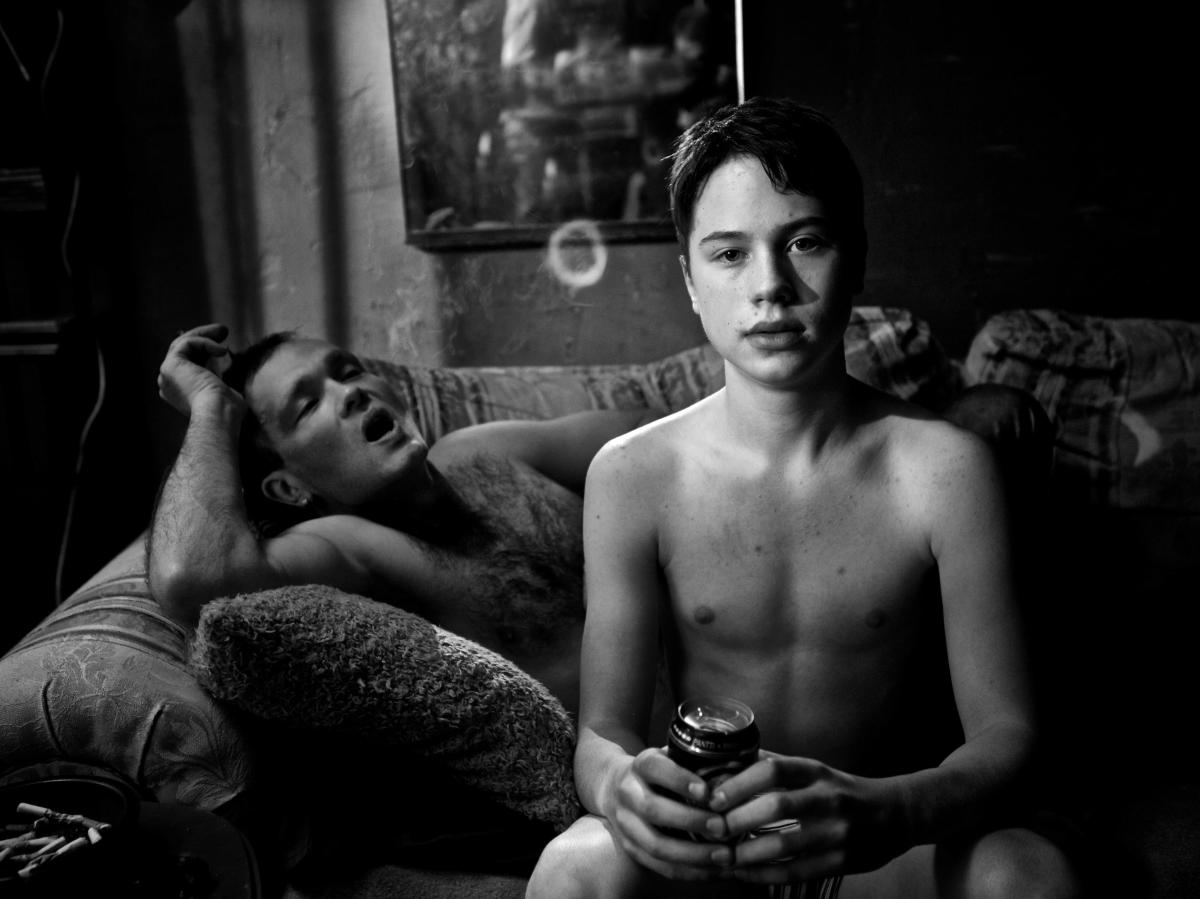Everything is a little off kilter in Concrete Night. ‘It feels weird, like a dream or something’, says 14-year-old Simo (Johannes Brotherus, Learned by Heart) to his older brother Ilkka (Jari Virman, Fanatics) after the lucid, lurid vision that provides the feature’s opening sequence. The unusual lurks in their claustrophobic apartment and the all-seeing vantage it gives them over a Helsinki neighbourhood that looks both familiar in its slum-like urbanity and alien in its industrial starkness. The ethereal emanates from imagery both precise and poetic in a black, white and grey palette that matches the specificity and surrealism of the film’s atmosphere of unease.
Inside the confines of their meagre home, Simo is both accustomed to living in close quarters with Ilkka and their struggling mother (Anneli Karppinen, TV’s Tehdas), and comfortable with being in his brother’s shadow; however an impending prison sentence will see Simo become the sole man of the house. In their last 24 hours together, they break free of the details of their bland domesticity – the flies that buzz along grimy windows, the cranky cat crawling along cramped kitchen counters, the shared sofa bed, the belongs strewn over every surface – to roam the streets in a final adventure of brotherly bonding and social defiance.
Concrete Night tells of the tragedy of maturing within an environment of fatalism and futility, with Simo a blank slate seeking his own identity and reason for existence, but too easily filled with the wrong ideas and impulses – be it the apocalyptic musings Ilkka imparts, or the invective of hatred he feels towards a peering, leering neighbour – given his tender years and slowly social station. In writer/director Pirjo Honkasalo’s (Ito: A Diary of an Urban Priest) adaptation of the 1981 novel of the same name, co-scripted with the book’s author and his Fire-Eater collaborator Pirkko Saisio, and modernised to contemporary times, the ability to act collides with the inability to effect change with heartbreaking clarity.
Showing rather than telling, exquisitely intricate monochrome visuals hold the key to a feature that pivots between the diffracted and the apparent. The distinctive style is a cypher as much as the characters, every touch delving the viewer deeper into Simo’s diverging mindset. At one end of the scale, his hypnotic visions of water are immediately established in the melancholic opening; at the other end, all things wet emerge as a recurrent motif as rivers call his name and rain streams from the sky. That only a small sliver of difference is evident between his sleeping and waking moments is indicative of the former bleeding into the latter.
The aesthetic complexity only continues throughout the meditative movie’s brief duration, as cinematographer Peter Flinckenberg (Do I Have to Take Care of Everything?) never shoots Simo’s face devoid of shading, nor misses an opportunity to follow his feet on their not-so-merry way, making plain the film’s voyage down a dire rabbit hole of his cloudy perception. The penchant for reflections in mirrors, windows, glasses, puddles and any other relevant surface provides more symbols of his fracturing, their repetition – like the impending doom of the narrative – becoming inevitable.
Far from being too obvious, the many expressionistic touches solidify a story that remains inescapably grim in its existential, political and sexual commentary. Still present, though never tempering the pervading brooding, are teasing glimpses of snatched beauty within the stifling bleakness. A similar approach can be seen in the performances, both Brotherus and Virman finding their tone, sticking with it, and offering gradual, earned variations as their protagonists evolve. The ending may be a foregone conclusion, yet Concrete Night builds its many manifestations of mood to pack not just a considerable punch, but a resounding, stinging wallop.
Rating: 4 out of 5 stars
Concrete Night (Betoniyö)
Director: Pirjo Honkasalo
Finland / Sweden / Denmark, 2013, 96 mins
Revelation Perth International Film Festival
www.revelationfilmfest.org
3 – 13 July
Actors:
Director:
Format:
Country:
Release:





